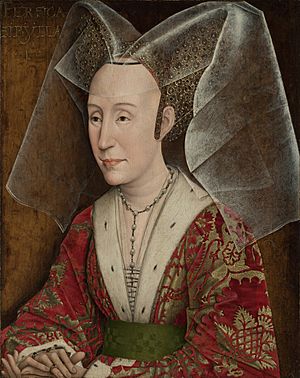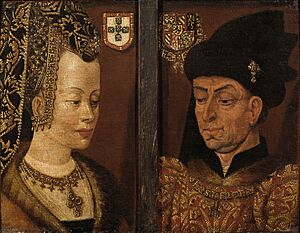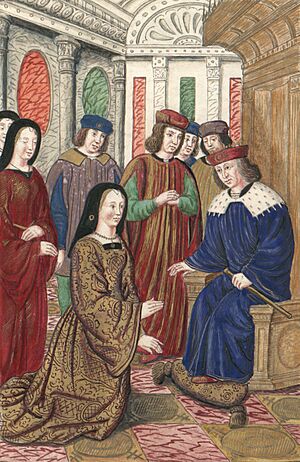Isabella of Portugal, Duchess of Burgundy facts for kids
Quick facts for kids Isabella of Portugal |
|
|---|---|

Isabel of Portugal, by Rogier van der Weyden c. 1450s
|
|
| Duchess consort of Burgundy | |
| Tenure | 7 January 1430 – 15 July 1467 |
| Born | 21 February 1397 Évora, Portugal |
| Died | 17 December 1471 (aged 74) Aire-sur-la-Lys, Burgundian Netherlands |
| Spouse | |
| Issue | Charles the Bold |
| House | Aviz |
| Father | John I of Portugal |
| Mother | Philippa of Lancaster |
Isabella of Portugal (Portuguese: Isabel de Portugal; 21 February 1397 – 17 December 1471) was a powerful and intelligent princess. She became the Duchess of Burgundy from 1430 to 1467. She was the third wife of Duke Philip the Good. Their son was Charles the Bold, who later became a famous Duke of Burgundy.
Isabella was born a Portuguese infanta, which means a princess. She belonged to the House of Aviz, a royal family. She was the only daughter of King John I of Portugal and his wife Philippa of Lancaster who lived to be an adult. Isabella was very active in politics. She even acted as the ruler of the Burgundian Low Countries when her husband was away. This happened in 1432 and again from 1441 to 1443. She also helped her husband in important talks with England about trade. She also helped with talks with cities in Holland that were causing trouble.
Contents
Early Life and Education
Isabella was born in 1397 in Évora, Portugal. She grew up in the royal court in Lisbon. She was the fourth child of King John I of Portugal and Queen Philippa of Lancaster. Her parents had six children who survived past infancy. Isabella was their only daughter to grow up.
Her mother, Philippa, taught all her children to be responsible and faithful. She also believed strongly in education. Isabella loved to read and was very interested in politics. Her father made sure she understood how governments worked. She studied alongside her brothers and learned about important state matters. She became very good at speaking Latin, French, English, and Italian. Isabella also enjoyed riding horses and hunting with her brothers.
In 1415, her cousin Henry V of England asked to marry her. England wanted to become closer friends with Portugal to stand against France. But these marriage talks did not work out. Isabella remained unmarried. In the same year, she was very sad when her mother died on July 19. They had been very close.
Marriage to Philip the Good
When Isabella was 30 years old, she was still unmarried. In 1428, the House of Valois in Burgundy offered her a marriage. The Duke of Burgundy, Philip the Good, had already been married twice before. His first two wives, Michelle of Valois and Bonne of Artois, had both passed away. Neither marriage had given him children who survived. For his third wife, Philip wanted someone from a country that was friends with England. This would help him keep his alliance with England strong. Isabella was a good choice because she was well-educated, smart, and talented.
On October 19, 1428, Philip sent a group of people from Sluys to Portugal. This group was led by his main advisor, the Seigneur de Roubaix. They arrived in Lisbon on December 16. They had stopped in Sandwich and picked up two more ships. The group waited for another month while Isabella's father and brothers talked about the marriage.
On January 19, 1429, the Burgundians formally asked for Isabella's hand in marriage. Talks between the two sides began. The Portuguese agreed to the marriage. They sent messengers to get Philip's official answer, which he signed on May 5. The Portuguese received it on June 4. The marriage contract was then written. Isabella, who was still in Portugal, was married to Philip the Good by proxy on July 29, 1429. This means someone stood in for Philip during the ceremony. Roubaix acted as the groom. Isabella finally arrived in Bruges on January 8, 1430.
Life as Duchess of Burgundy
Isabella stayed in Portugal for eight more weeks after her proxy marriage. Her father prepared a fleet of ships and a special collection of clothes and items for her wedding. On October 19, 1429, Isabella left Portugal forever with about 20 ships and nearly 2,000 Portuguese people. Her journey lasted eleven weeks. The fleet faced many storms, losing several ships and much of her wedding trousseau. They finally reached Sluys on December 25, 1429.
The Duchess stepped off the ship the next day. Two weeks later, on January 7, 1430, she and Philip had their formal religious wedding. After the wedding, Isabella traveled through the main areas of Burgundy with her husband. She visited cities like Ghent, Kortrijk, Lille, and Brussels. By mid-March, she was in Noyon. Isabella was pregnant and decided to rest there through the spring. She only left when Joan of Arc led a military campaign nearby. She then returned to Ghent, where she helped deal with a possible uprising by a guild.
At first, Isabella was not ready for the very fancy court life in Burgundy. It was one of the most extravagant in Europe. The Portuguese princess had seemed very simple to the Burgundian group who arranged her marriage. Now, she wore loose clothes to hide her pregnancy. She looked quite plain compared to the people at her new court.
Isabella gave birth to her first child, Antoine, on December 30, 1430, in Coudenberg in Brussels. This was a year after her marriage. Antoine was not very strong when he was born. He was christened on January 16, 1431. Soon after, both parents left to take care of important ducal business. By the autumn of that year, Isabella was pregnant again with their second son, Joseph. More importantly, she had spent a long time with her husband. She showed him how intelligent and capable she was. She also showed how much she cared about Burgundy being independent.
Because of this, when Charles VII of France started attacking Burgundy in January 1432, Philip left to defend Dijon. He told Isabella to represent him while he was away. Antoine and Joseph both passed away in 1432. But the Duchess then gave birth to her third son, Charles the Bold, on November 10, 1433. He would later become the next Duke.
Isabella was a very refined and smart woman. She enjoyed being around artists and poets. She was a generous supporter of the arts. In politics, she had a big influence on her son. She had an even greater influence on her husband. She represented him at several important diplomatic meetings. She also governed the region when he was away. She was especially good at arranging marriages for people at her court. This included arranging her son Charles's marriage to Catherine of France. She also took special care of Mary of Guelders, who was with Catherine. Isabella helped arrange Mary's marriage to James II of Scotland, which made Mary a queen.
Later Life and Legacy
By 1457, Isabella had started to spend less time at court. She also became more distant from her husband. This was partly because she supported her son in his disagreements with his father. It was also because she wanted to live a more religious and peaceful life. Her personal feelings sometimes conflicted with her husband's decisions. This led her to leave the main court and live in the castle of La Motte-au Bois. There, she created her own small court. This place became a safe haven for people who were negatively affected by her husband's official policies.
During this time, she helped the people of Flanders who were harmed by Philip's military actions. She also helped Josse van Huerter become an advisor to her nephew, Ferdinand of Portugal.
After Henry VI of England passed away without any children, Isabella claimed her right to the English throne. She wrote a document on June 17, 1471, saying she was Henry's rightful heir. This was because her grandfather, John of Gaunt, was also Henry's great-grandfather. She later gave up this claim to her son, Charles, one month before she died.
Isabella of Portugal passed away in Aire-sur-la-Lys in December 1471.
 | Georgia Louise Harris Brown |
 | Julian Abele |
 | Norma Merrick Sklarek |
 | William Sidney Pittman |



